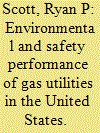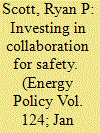|
|
|
Sort Order |
|
|
|
Items / Page
|
|
|
|
|
|
|
| Srl | Item |
| 1 |
ID:
168663


|
|
|
|
|
| Summary/Abstract |
The performance of energy service providers has important environmental and safety consequences in local communities. This paper uses a novel dataset compiled from operator reports and infrastructure monitoring data obtained from three different US federal agencies to assess the performance of retail gas utilities nationwide in terms of addressing gas leaks and minimizing leaked volume. Our panel data set includes yearly observations for 727 retail gas utilities from 2009 to 2017. We show that safety hazards and environmental costs of gas leaks are widespread across providers that vary in terms of ownership, size, and region. We then use a series of Bayesian hierarchical models to regress four outcome variables—hazardous leaks, end-year unfixed leaks, total gas volume leaked, and significant incidents—on infrastructure conditions, regional service context, and socio-economic service population characteristics. Unlike what is observed in other critical infrastructure cases such as drinking water, socio-economic conditions are not strongly predictive of service outcomes. Additionally, public utilities exhibit better environmental performance on average, and no difference in maintenance backlogs. Because the environmental costs of poor performance--primarily in terms of methane greenhouse gas emissions--are predominantly social, policy tools such as consolidation and privatization are unlikely to improve environmental outcomes.
|
|
|
|
|
|
|
|
|
|
|
|
|
|
|
|
| 2 |
ID:
162891


|
|
|
|
|
| Summary/Abstract |
Oil and gas pipeline leaks are the responsibility of a wide range of stakeholders including utilities, the public, construction firms and state safety program personnel. As a result, in the United State, state pipeline safety programs focus heavily on public education, outreach, and stakeholder participation so as to reduce the occurrence of these events. The US Pipeline & Hazardous Materials Safety Administration (PHMSA) directs federal support to state safety efforts through formula and project grant programs for state and local agencies that emphasize different aspects of collaboration. We combine these grant data with nationwide, longitudinal records on pipeline leaks, and use a multilevel Bayesian model to evaluate how different grant emphases relate to subsequent incident rates. State damage prevention grants are not associated with reductions in leaks but are associated with improvements in error recognition. Pipeline incidents are downstream from safety programs and impacts and identifying, minimizing, and correcting leaks requires states to motivate utility actions while also attempting to improve public awareness. This makes assessment of safety outcomes a challenge without better tracking of safety program communications and participation. In conclusion, we suggest improvements to data provision by states that could provide improved evidence for assessing safety improvements.
|
|
|
|
|
|
|
|
|
|
|
|
|
|
|
|
|
|
|
|
|